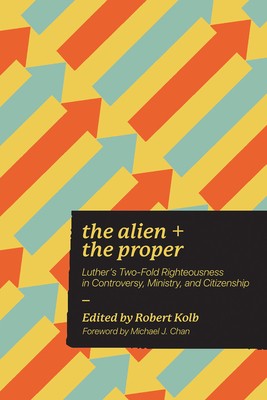
- We will send in 10–14 business days.
- Publisher: 1517 Publishing
- ISBN-10: 1956658173
- ISBN-13: 9781956658170
- Format: 15.2 x 22.9 x 1.4 cm, minkšti viršeliai
- Language: English
- SAVE -10% with code: EXTRA
The Alien and the Proper (e-book) (used book) | bookbook.eu
Reviews
Description
In his Galatians commentary of 1535, Martin Luther insists that "our theology" relies on the proper distinction of two kinds of righteousness: Alien and Proper. In relation to our Creator, we freely receive our "alien" righteousness from Christ who has obtained it for us through his death and resurrection. In relation to humanity and God's created order, we practice a "proper" righteousness by actively fulfilling God's commands that set down the form and pattern for good human living.
Luther posited that this distinction was the key to understanding our humanity. His regular use of this anthropological principle, particularly when applied to justification by faith, the nature of sin, and the proper practice of God's gift of humanity, demonstrates its centrality and importance.
In this collection of essays, five authors examine the historical development of Luther's Twofold Righteousness and propose ways in which it can continue to serve Christians today. Through these essays you will learn about Luther's radical divergence from medieval theological formulations, and you will discover what it means to be human.
EXTRA 10 % discount with code: EXTRA
The promotion ends in 23d.13:00:01
The discount code is valid when purchasing from 10 €. Discounts do not stack.
- Publisher: 1517 Publishing
- ISBN-10: 1956658173
- ISBN-13: 9781956658170
- Format: 15.2 x 22.9 x 1.4 cm, minkšti viršeliai
- Language: English English
In his Galatians commentary of 1535, Martin Luther insists that "our theology" relies on the proper distinction of two kinds of righteousness: Alien and Proper. In relation to our Creator, we freely receive our "alien" righteousness from Christ who has obtained it for us through his death and resurrection. In relation to humanity and God's created order, we practice a "proper" righteousness by actively fulfilling God's commands that set down the form and pattern for good human living.
Luther posited that this distinction was the key to understanding our humanity. His regular use of this anthropological principle, particularly when applied to justification by faith, the nature of sin, and the proper practice of God's gift of humanity, demonstrates its centrality and importance.
In this collection of essays, five authors examine the historical development of Luther's Twofold Righteousness and propose ways in which it can continue to serve Christians today. Through these essays you will learn about Luther's radical divergence from medieval theological formulations, and you will discover what it means to be human.


Reviews